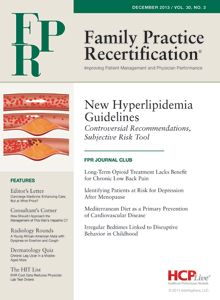Publication
Article
Family Practice Recertification
Mediterranean Diet as a Primary Prevention of Cardiovascular Disease
Author(s):
Compared to a low-fat diet, adherence to a Mediterranean diet has significant benefit in the primary prevention of cardiovascular disease among patients aged 55-80 years old at high baseline cardiovascular risk without cardiovascular disease.
Review
Primary Prevention of Cardiovascular Disease with a Mediterranean Diet. N Engl J Med. 2013;368:1279-90. http://www.nejm.org/doi/full/10.1056/NEJMoa1200303.
Study Methods
This was a parallel-group, multicenter, randomized controlled trial of 7,447 adults in Spain. Endpoints were analyzed in blinded individuals with a median follow-up of 4.8 years.
Patient Demographics
Patients were males aged between 55-80 years old and females aged between 60-80 years old who were considered to be at high cardiovascular risk because they had either type 2 diabetes mellitus or at least 3 of the following cardiovascular risk factors: smoking, hypertension, high low-density lipoprotein (LDL), low high-density lipoprotein (HDL), overweight, or a family history of early coronary heart disease (CHD).
Intervention and Control
Two separate intervention groups were assigned to a Mediterranean diet described as “high intake of olive oil, fruit, nuts, vegetables, and cereals.” The diet was also defined as “moderate intake of fish and poultry; a low intake of dairy products, red meat, processed meats, and sweets; and wine in moderation, consumed with meals.” The group was also divided as 1 arm supplemented with 30 g mixed nuts per day and another arm supplemented with approximately 1 L extra virgin olive oil per week. Both groups received support via quarterly dietary training.
The control group received dietary advice on a low-fat diet, as well as small non-food gifts. Dietary training in the control group was yearly for the first 3 years of the trial, and then quarterly starting in 2006 to better match the intervention group. The trial did not involve any changes in physical activity or caloric restriction.
Results and Outcomes
The primary endpoint was a composite of cardiovascular events — which included myocardial infarction, stroke, and death from cardiovascular causes — while secondary endpoints were stroke, myocardial infarction, death from cardiovascular causes, and death from any cause. Events that occurred between October 1, 2003, and December 1, 2010, were measured via contacts with participants and family physicians and a yearly review of medical records and the National Death Index. Those who examined the endpoints were blinded to the study group assignments.
The data was analyzed with an intention-to-treat model with a median follow-up of 4.8 years. The major dietary changes observed in the Mediterranean diet groups were increase in consumption of fish, legumes, and the supplemental foods, which were nuts or extra virgin olive oil.
The unadjusted hazard ratios for the primary endpoint was 0.7 for the Mediterranean diet with extra virgin olive oil (95% confidence interval [CI], 0.53 to 0.91) and 0.7 for the Mediterranean diet with nuts (95% CI, 0.53 to 0.94) as compared to the control diet, which demonstrated a statistically significant difference (P= 0.015). When adjusted for significant differences in baseline characteristics, hazard ratios remained significant (0.71 [95% CI, 0.56—0.90] for the combined Mediterranean diets versus the control diet.
Among the secondary endpoints, only stroke showed a significant difference with a hazard ratio of 0.61 (95% CI, 0.44—0.86; P= 0.005). There was no apparent difference in all-cause mortality (P= 0.32).
The safety monitoring board recommended stopping the trial after 4 yearly interim analyses demonstrated that the Mediterranean diet had crossed the predetermined stopping P value of 0.02.
Conclusion
A significant benefit was found in adherence to a Mediterranean diet as compared to a low-fat diet in the primary prevention of cardiovascular disease among patients aged 55-80 years old at high baseline cardiovascular risk without cardiovascular disease. This finding was consistent with several previous studies that also examined the potential benefits of the Mediterranean diet on cardiac outcomes.
Commentary
Cardiovascular disease is the leading cause of death in most of the world, with risk factors that include smoking, hypertension, dyslipidemia, obesity, and family history of premature heart disease. In addition to medication and smoking cessation, dietary modification has been employed as one of the primary prevention methods to lower cardiovascular risk.
The Mediterranean diet is based on trends in eating habits of those living in the Mediterranean area, and it is described to be:
[h]igh in fruits, vegetables, grains, potatoes, beans, nuts, and seeds. It includes olive oil as an important fat source and dairy products, fish, and poultry consumed in low to moderate amounts; eggs consumed 0 to 4 times weekly; and limited red meat. In addition, wine is consumed in low to moderate amounts.1
This diet has been studied as a healthy alternative to other diets for many years, with research supporting its effects on weight loss, diabetes,2 cardiovascular disease,3 cancer, Alzheimer’s, and Parkinson’s disease.4 In particular, the Lyon Diet Heart Study published in 1999 demonstrated that the Mediterranean diet significantly reduced mortality for those with cardiovascular disease.5
This study adds to those findings by showing that the Mediterranean diet could be of benefit as a primary prevention for patients with high cardiovascular risk without cardiovascular disease. It contributes to a growing body of evidence supporting the Mediterranean diet as beneficial to cardiovascular health, which is consistent with the observation that Mediterranean countries have lower cardiovascular mortality than the Unites States. Strengths of the study include its design as a blinded, randomized controlled trial and its large number of subjects with an almost equal representation of men and women.
While this study has encouraging results, one important consideration is the challenge of its adoption in general practice, particularly in the United States. The authors also point out they only studied those at high cardiovascular risk, so the benefits they uncovered may not be applicable to the general population. In addition, the study was performed in Spain, where many of the participants already followed a diet very similar to the Mediterranean diet, which implies a more substantial dietary change would be required to benefit the US population.
Replicating this study in the US would involve significant hurdles. Factors that would require funding include providing quarterly dietary training, tracking dietary adherence, and providing patients with supplemental nuts and/or olive oil.
Those supplemental foods represented the major difference in diet among the study groups, and the authors note that they were “probably responsible for most of the observed benefits of the Mediterranean diets.” Even within the Mediterranean diet group, dropout rates were high in this study, which indicates that in an “intention-to-treat” model, not every patient will be amenable to this intervention.
Nevertheless, patients who are willing and able to undergo dietary modifications to improve their health should be educated about the benefits of the Mediterranean diet, with specific instructions to increase fruits, vegetables, fish, nuts, olive oil, and limit red meat.
References
1. Kris-Etherton P, et al. Lyon Diet Heart study: benefits of a Mediterranean-style, national cholesterol education program/American Heart Association step I dietary pattern on cardiovascular disease. Circulation. 2001 Apr 3;103(13):1823-25.
2. Martínez-González MA, et al. Adherence to Mediterranean diet and risk of developing diabetes: prospective cohort study. BMJ. 2008 Jun 14; 336(7657):1348—51.
3. Ajala O, English P, Pinkney J. Systematic review and meta-analysis of different dietary approaches to the management of type 2 diabetes. Am J Clin Nutr. 2013 Mar;97(3):505-16.
4. Sofi F, et al. Adherence to Mediterranean diet and health status: meta-analysis. BMJ. 2008 Sep 11;337: a1344.
5. de Lorgeril M, et al. Mediterranean diet, traditional risk factors, and the rate of cardiovascular complications after myocardial infarction: final report of the Lyon Heart Study. Circulation. 1999;99(6):779-85.
About the Author
Courtney Sullivan, MS IV, is a medical student and student co-leader of the Anesthesia Interest Group at the University of Massachusetts Medical School in Worcester, MA.
She was assisted in writing this article by Frank J. Domino, MD, Professor and Pre-Doctoral Education Director for the Department of Family Medicine and Community Health at the University of Massachusetts Medical School and Editor-in-Chief of the 5-Minute Clinical Consult series (Lippincott Williams & Wilkins).






